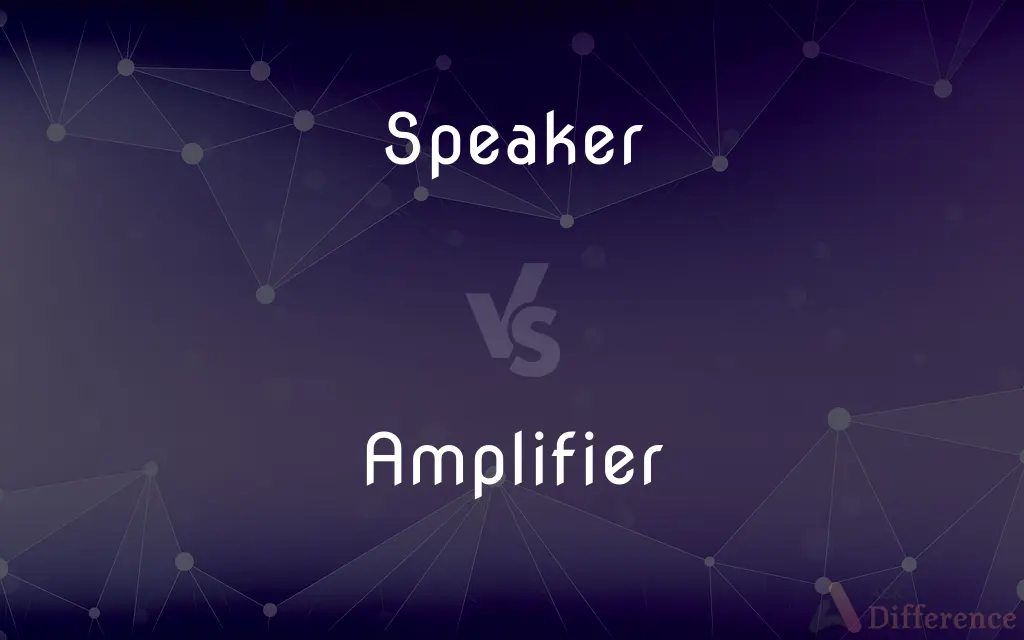Speaker vs. Amplifier — What's the Difference?
Edited by Tayyaba Rehman — By Urooj Arif — Updated on April 16, 2024
A speaker converts electrical signals into sound, focusing on output quality, whereas an amplifier boosts these signals for the speaker to use.

Difference Between Speaker and Amplifier
Table of Contents
ADVERTISEMENT
Key Differences
A speaker is designed to produce audio output from electrical signals, focusing on sound clarity and fidelity. On the other hand, an amplifier is used to increase the power of these signals before they reach the speaker.
Speakers come in various forms, such as dynamic, planar magnetic, and electrostatic, each with unique sound characteristics. In contrast, amplifiers vary mainly in terms of power output and circuit design, impacting sound quality and volume.
The primary function of a speaker is to convert amplified electrical signals into audible sound through its components like woofers and tweeters. Amplifiers, however, serve to manage and boost the audio signal's strength without actually producing any sound.
In a typical audio system setup, the quality of the speaker is crucial for the final audio output, emphasizing accurate sound reproduction. Amplifiers enhance this by ensuring that the speaker receives enough power to perform efficiently.
While speakers directly interact with the listener by producing sound, amplifiers work behind the scenes, integral for driving the speaker but not directly noticed by listeners.
ADVERTISEMENT
Comparison Chart
Function
Converts electrical signals into sound.
Boosts electrical signals' power.
Types
Dynamic, planar magnetic, electrostatic.
Tube, solid-state, digital.
Role in Audio System
Produces the audio that listeners hear.
Powers the speakers without noise.
Dependency
Depends on amplifier for signal strength.
Can function without a speaker.
Sound Contribution
Directly responsible for sound quality.
Influences volume and clarity.
Compare with Definitions
Speaker
Component in audio systems delivering sound to listeners.
She adjusted the speaker to improve room sound.
Amplifier
Often part of a larger audio system setup.
The new amplifier integrates seamlessly with his existing system.
Speaker
Varies in size and design based on use.
Portable speakers are popular for outdoor activities.
Amplifier
Device that increases the power of audio signals.
The amplifier can drive multiple speakers simultaneously.
Speaker
Often includes subunits like woofers and tweeters.
His new speaker has a tweeter optimized for high frequencies.
Amplifier
Critical for controlling sound quality and volume.
He adjusted the amplifier to reduce distortion.
Speaker
Device for converting electrical signals into audible sound.
The speaker's bass response is excellent.
Amplifier
Comes in various types like tube, solid-state.
Audiophiles often prefer tube amplifiers for their warm sound.
Speaker
Can be passive (requiring external power) or active.
His active speaker has a built-in amplifier.
Amplifier
Can function independently or within integrated units.
His home theater system includes an integrated amplifier.
Speaker
One who speaks.
Amplifier
An amplifier, electronic amplifier or (informally) amp is an electronic device that can increase the power of a signal (a time-varying voltage or current). It is a two-port electronic circuit that uses electric power from a power supply to increase the amplitude of a signal applied to its input terminals, producing a proportionally greater amplitude signal at its output.
Speaker
A spokesperson.
Amplifier
One that amplifies, enlarges, or extends.
Speaker
One who delivers a public speech.
Amplifier
An electronic device that is used to increase the magnitude of an electrical signal.
Speaker
Often Speaker The presiding officer of a legislative assembly.
Amplifier
A device that is used to increase the magnitude of an information-carrying signal.
Speaker
The person, sometimes the actual writer but often an assumed character, who is imagined as the source of the words or ideas expressed in a poem.
Amplifier
Anything that amplifies, or makes something larger or more intense.
Speaker
A device that converts electric signals to audible sound.
Amplifier
(linguistics) An adverb that adds intensity, such as "really" or "totally".
Speaker
One who speaks.
There were three different speakers, but I couldn't make out their accents.
Amplifier
(electronics) An appliance or circuit that increases the strength of a weak electrical signal without changing the other characteristics of the signal.
Speaker
Loudspeaker.
She lost her hearing after standing too close to the speaker at the festival.
Amplifier
(music) A portable encasement that houses a large speaker, used to amplify voices and musical instruments at live performances.
Speaker
Speakerphone.
Amplifier
A lens that enlarges the field of vision.
Speaker
(politics) The chair or presiding officer of certain legislative bodies, such as the U.K. House of Commons or the U.S. House of Representatives.
Amplifier
One who or that which amplifies.
Speaker
One who makes a speech to an audience.
The company hired a motivational speaker to boost morale.
Amplifier
Electronic equipment that increases strength of signals passing through it
Speaker
(US) A book containing passages of text for use in speeches.
Speaker
The producer of a given utterance, whether speech or text.
Speaker
(poetry) The literary character uttering the lyrics of a poem or song, as opposed to the author writing the words of that character.
Popular culture often incorrectly attributes quotes from the speakers of poems or songs to the authors thereof, as when "I took the one less traveled by" is attributed to Robert Frost rather than to the speaker in Frost's "The Road Not Taken".
Speaker
(music) A key on a woodwind instrument of the clarinet family (cf octave key on other instruments) which induces the instrument to overblow.
Speaker
One who speaks.
Speaker
A book of selections for declamation.
Speaker
Someone who expresses in language; someone who talks (especially someone who delivers a public speech or someone especially garrulous);
The speaker at commencement
An utterer of useful maxims
Speaker
Electro-acoustic transducer that converts electrical signals into sounds loud enough to be heard at a distance
Speaker
The presiding officer of a deliberative assembly;
The leader of the majority party is the Speaker of the House of Representatives
Common Curiosities
What is the difference between an active and passive speaker?
Active speakers have built-in amplifiers, while passive speakers require an external amplifier.
How does an amplifier affect a speaker's performance?
An amplifier boosts the signal strength, enabling the speaker to produce louder and clearer sound.
What types of speakers are most common in home audio?
Dynamic speakers are most common in home audio systems.
Can any amplifier work with any speaker?
Compatibility depends on the speaker’s impedance and the amplifier’s power output.
What is the advantage of having multiple types of speakers in a system?
Multiple speaker types enhance audio range and depth, covering various sound frequencies.
Can you use an amplifier without a speaker?
Yes, an amplifier can increase signal strength independently of a speaker.
How do I choose the right amplifier for my speakers?
Choose an amplifier with power output matching the speaker's requirements to avoid distortion.
What is the main function of a speaker?
A speaker's main function is to produce audible sound from electrical signals.
What are the benefits of using a tube amplifier?
Tube amplifiers are known for producing a warm, rich sound.
What role does an amplifier play in a car audio system?
In car audio systems, the amplifier boosts the audio signal to overcome road noise.
How does speaker design impact sound quality?
Speaker design affects sound dispersion and quality, influencing how audio is experienced in a space.
What should I consider when setting up a home theater system?
Consider the compatibility and placement of speakers and amplifiers for optimal sound.
Share Your Discovery

Previous Comparison
Perform vs. Create
Next Comparison
Further vs. FutureAuthor Spotlight
Written by
Urooj ArifUrooj is a skilled content writer at Ask Difference, known for her exceptional ability to simplify complex topics into engaging and informative content. With a passion for research and a flair for clear, concise writing, she consistently delivers articles that resonate with our diverse audience.
Edited by
Tayyaba RehmanTayyaba Rehman is a distinguished writer, currently serving as a primary contributor to askdifference.com. As a researcher in semantics and etymology, Tayyaba's passion for the complexity of languages and their distinctions has found a perfect home on the platform. Tayyaba delves into the intricacies of language, distinguishing between commonly confused words and phrases, thereby providing clarity for readers worldwide.
















































